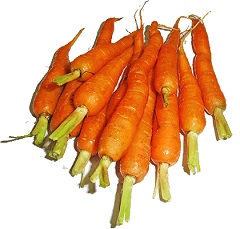
Raw Food Diet, the Natural Way!
Can following a raw food diet really make a difference?
After all the huge craze about counting calories, the fad of jumping on the soy diet bandwagon, and the nutritional phobias about too much or too little fat, protein or carbohydrates in diets, today, the raw food diet which promises fast and easy digestion has taken off with a big bang and started a huge eating trend. Celebrities, restaurants, food manufacturers, and lifestyle books and magazines are extolling and touting the benefits of detoxing the body by eating unprocessed foods such as vegetables, nuts, wheatgrass, fruits, and even honey. Raw food diet advocates no cooking, no frying, no baking, no grilling, no steaming, no application of whatever kind of heat. It is grounded based on the belief that eating more uncooked food will reduce the amount of digestive enzymes your body has to produce.
Unprocessed natural foods are in their best natural state with the enzymes left intact. Enzymes, also known as "live force" are biological catalysts needed to perform many functions in the body including digestion, assimilation and elimination of food. A lack of enzyme can result in vitamin and mineral deficiencies.

In cooking, part of the food nutrition which includes the enzymes and amino acids is destroyed. Furthermore, the more food is cooked and processed and the higher the temperature that food is cooked, the more difficult it is to digest and metabolize. Cooked food not only passes through the digestive tract more slowly than raw food, it also tends to ferment, and returns poisons back into the body, making it more difficult for the food to absorb and work on the regeneration of cells. The worst types of foods are those that contain artificial sweeteners and colourings, a truth that not everyone knows, as very often you would hear some people saying, "trying to stay slim, take diet cola instead of regular cola, replace table sugar with artificial sweeteners in your food..."
~Hippocrates, Greek physician (460 BC - 377 BC)

We are what we eat. Over time, our bodies build up poisons and store waste from food that is not fully eliminated, leading to health problems like weight gain, a degeneration of the organs, a slowing of the metabolism and premature aging. Food, by itself, has no healing power, but our body has an incredible capacity for recovery. Uncooked, natural foods can give our body the raw materials it needs to detoxify, to create energy, and to rebuild. When a detox process is enabled via eating raw foods, the pressure placed on the lymphatic system, the blood, brain, organs and the entire body is reduced. It enables the body to flush purge out the toxins and put us back on the road toward greater energy, clearer skin and shinier hair, and a slimmer body. Other well-known, inspiring benefits of going raw include better digestive system, stronger immunity, and lower cholesterol.
But how much of raw food should our diet comprise? Many raw-foodists or rawists advocate "the more the better". Personally, as much as I am eager to incorporate as much uncooked food as possible in my diet, it is extremely challenging to make the jump over to a 100% fully raw diet (living foods only, nothing dead or cooked, no processed foods), implement and sustain it every day for long term. For now, I am still not able to imagine myself being able to operate on absolutely no bread, no rice, no pasta, no noodles, no salt, no dried fruits like raisins or dates. Juicing with fruits and vegetables is a good way to start but I still have to find easy to prepare raw food recipes and take time to research the various foods that could be eaten in their raw state and understand their unique qualities. Going 100% raw, I reckon, is going to be a learning experience that requires lots of patience and listening to the body's needs.

Amazon's Raw Masterpieces
Phenomenal, stunning treats that are raw, vegan and gluten-free. Suitable for vegetarians, raw vegans or even a meat-lovers who are just looking for healthy and delicious food.
End of "Raw Food, the Natural Way!" Back to "Seeking Natural Cure".